With sixty-plus years of experience under his belt, photographer Joe Anderson’s work can be expressed as nothing short of inspirational. Joe can be described as a citizen of the globe and enjoys capturing the many facets of beauty of the world during his many travels. Through his lens, Joe has the ability to capture and convey his enthusiasm for his subjects and their relationship to their environment. As you browse through his photographs below, I think you’ll agree that he’s quite an accomplished and skilled photographer.
Joe, thank you so much for sharing your experiences with us and thank you so much for all your thoughtful responses. It’s not every day we get a behind the scenes view of such an engaging and talented artist.
If you’d like to learn more about Joe, please visit his website. You can also follow him on Instagram.
Can you please tell the readers a bit about yourself?
Going into the Marine Corp right out of high school I worked my way up to becoming a KC 130 tanker refueler flight instructor. While in the service I attended The University of Southern CA and received a Master’s Degree in Electrical Engineering. After getting out of the service I decided to go for a degree in Mechanical Engineering and received my Masters from Cornell University.
I started my own manufacturing company “Essex Tool and Die Company Inc.” shortly after college and retired in 1997 from a very successful and enjoyable business life.
It was after retirement that my wife and I started traveling. We went to Sweden to meet my cousins and ended up buying a home and living there for ten years. We have traveled all over Europe, Iceland, and Canada just to mention a few places.
Returning to the States to enjoy our great-grandchildren we ended up in Eastern Tennessee. After four years there we got antsy to hit the road and see the States so we sold our home and bought a 40’ Tiffin Motorhome. We have been on the road for eight years now and enjoying every minute of it with no regrets.
My photography has been self-taught and as we travel I do one or two-day workshops, showing people how and where I obtained the images I have immensely enjoyed capturing.
As we have traveled all over the States, several times now, I am able to find new things to photograph even at the same places I have been at many times.
What we have been doing as we travel is volunteering for the US Fish and Wildlife Service on Refuges. It gives us the opportunity to get out and see things that the general public doesn’t see.
Where is home?
You could say that our home is where the motorhome stops for the night!
What type of camera(s) do you shoot with? What is your favorite lens?
I started taking photos early in 1955 using my parents’ 1930 Kodak 50th Anniversary Brownie 120 Film Box Camera. Developing all my own film “after it was dark outside in my parent’s kitchen” I knew then that I was hooked on photography. I went through several film cameras before switching to Canon’s DSLR when they came out. I have several Canon cameras and lenses but I would say my favorite is my Canon 1dx MK ii camera with a Canon 400mm 2.8 Version iii prime lens attached and coupled with a Canon 2x Version iii extender giving me 800mm of tack sharp images. On my Induro CT314 tripod is mounted a Feisol UA 180 Gimbal head. As well as the lens being attached to the Gimbal head I have a 7” Lilliput Monitor and a Rodeo Mike. At times I also attach a Canon 580 flash and Better Beamer to obtain a faster shutter speed.
What is in your camera bag?
My camera bag is plural, to say the least, I have several.
How important is Photoshop or other image editing software in your final images?
I am not a user of Photoshop, Lightroom, or any of the other software that most people are familiar with. Many years ago I bought a simple software for $19 called Smart Photo Editor and it is all I have ever used. I tell people in my workshops that the photo is in the camera and not the software. I would much rather spend my time in the field rather than hours behind the computer screen. For the most part, I spend less than two minutes on a single image, crop it if need be frame it, and sign it, done!
Do you have any favorite images? Could you explain the background stories behind them?
With well over a million photos taken it is hard to say what my favorites are. It is more so the memories that I have that are associated with the image. Seeing and helping a beginner to photography is most enjoyable.
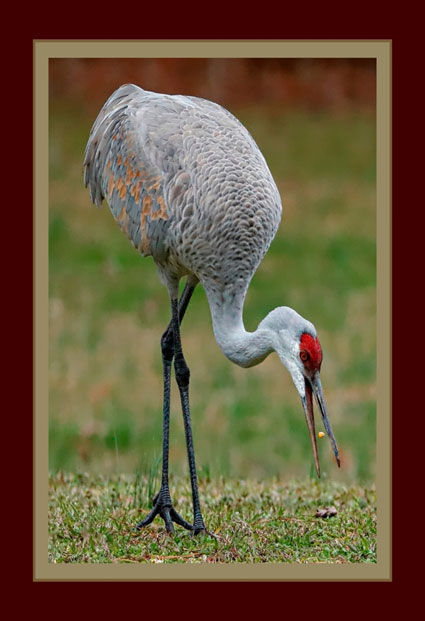
The image above is a good example of being in the right place at the right time.
This Sandhill Crane was so close that I didn’t need to crop the image and caught him just as he picked up a piece of corn.
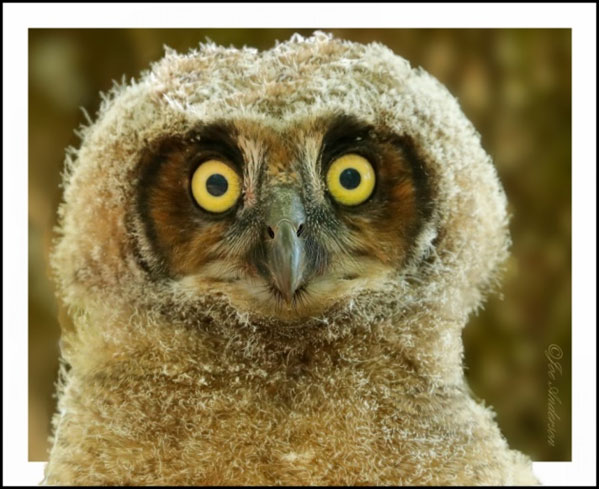
Another image I love was of this young owl that couldn’t even fly yet and looking very puzzled while waiting for its mother to return.

I enjoy this image because I love waterfalls. This one in particular because it is a great place to sit and relax for hours on end and just look and listen.
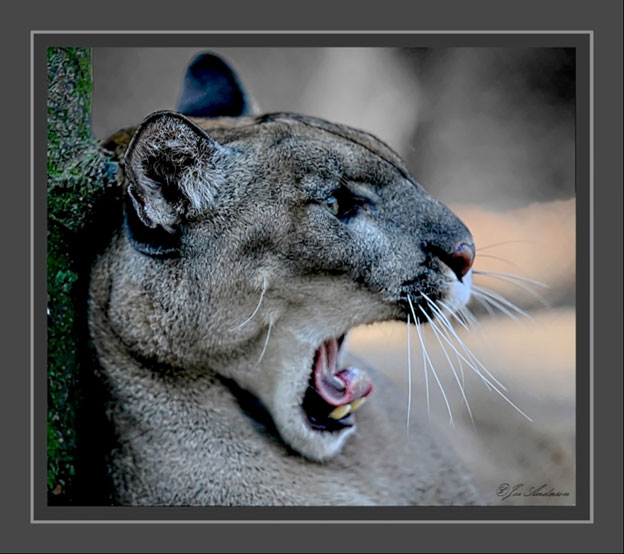
This photo was special because I was able to see this rare Florida Panther in the wild.
It was taken in the Florida Everglades. There are only about 110 in the wild.
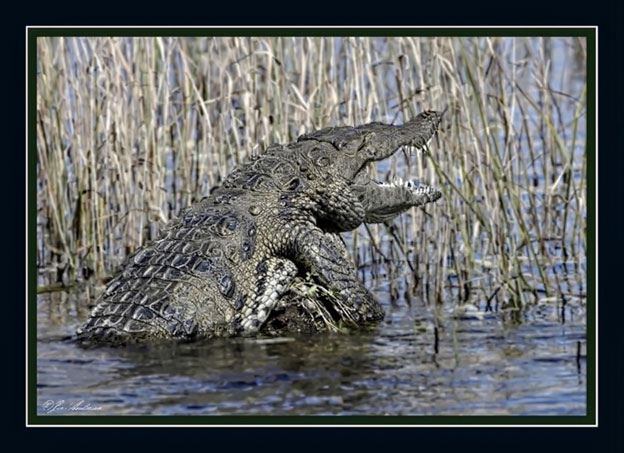
It’s not very often that you will see a Crocodile in freshwater. It was taken in the Florida Everglades.
Do you have any projects that make you look back and shake your head? What made the experience so unpleasant?
The only unpleasant experience that I can recall having over the decades of pushing the shutter button was the time I was in the Sierra Mountains of California in the winter at 12,000 foot in the snow almost to my waist and falling having my Canon 180mm macro lens hit the ice-packed snow, jamming the threads on the end of the lens. Lesson learned: always keep your lens hood on the lens.
Was there a point in your journey when you started to feel really good about your work? If so, what did it feel like to get past that ‘tipping point’?
I guess the point in my life when I started to feel good about my work was when I started to receive blue first place ribbons for my photos in various State contest. Then when I started selling my works I knew they would hang on someone’s walls for years to come. I found one of the best places to sell photos was to interior decorators. My wife and I also had a greeting card business which we did very well.
What is the inspiration for your photography?
The one thing that inspires me to keep photographing is the thought of getting that “one in a million image”.
How do you choose what you are going to shoot?
When I go out to photograph I go with the same idea I plant in all my workshop photographers’ mines. That being said, “There is a photo in everything you look at you just have to look for it”.
When shooting subjects, what do you find most challenging?
Birds are probably the most difficult things for people to master but bring great enjoyment once you tackle it.
Do you have any words of advice or encouragement to someone starting out with or wanting to improve their photography skills?
Advice that I always give in my workshops are as follows:
The first thing that I tell them is how I spell photography. It is spelled “patience”.
Always remember that a picture is something that anyone can take an image or photo is a form of art.
Don’t just stand in front of something and take the shot (such as a waterfall), look at it from several different angles. I will tell people to even get down on the bellies and see how different things can look.
I have sat for hours waiting to get some images or returned day after day.
If we are somewhere for a few days and I see a trail through the woods or a field I will put out my trail camera to see what has been using the trail. You will be surprised by what you can capture on a trail camera. This will help you to get great photos if you and your camera gear are in a small portable photo blind close to the trail. Your trail camera will tell you the time of day the animal traveled, what direction, and much more.
What do you think the future holds for you? Where do you see yourself in the next few years?
My future plans are to keep on looking for that once in a lifetime image as long as I can still get around. I did a TV series for Animal Planet a couple of years ago and am working on another TV series right now.
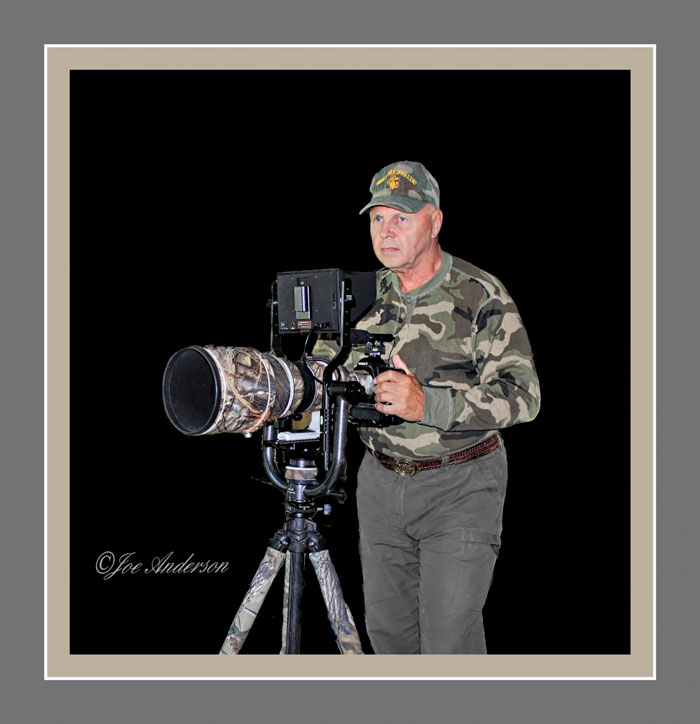
Life is like a Camera, Focus on what’s Important
Develop from the Negatives, Capture the Good Times
And…If Things Don’t Work Out
Take another Shot.
Leave a Reply